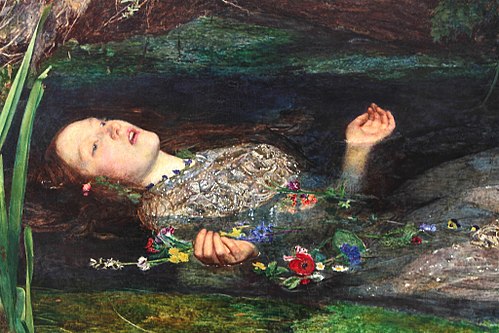Ophelia

Sir John Everett Millais’ 1852 painting “Ophelia” might be subtitled “Western Literature’s Woman.” It seems to me that the history of Western Literature has prescribed this role for its women: the drowned suicide of men’s struggles for power and control. Ophelia is the metaphor for a real world of patriarchal desire for control. Ophelia is not alone, nor is she the first. The major contentions in Homer’s Iliad are caused by women as chattel: who owns Helen, Menaleaus or Paris? Who owns Briesis, Agamemnon or Achilles? Is men’s relationship with women still one of ownership and possession?
Ophelia is the beautified victim of a system that is flawed, yet still holds sway. I’m reminded of those women that oppose abortion rights—battling to grant others the control of their bodies. Or Mary Cheney, a full supporter of a father that tells her she does not deserve the same rights as normal people by supporting the Bush administration. Or the millions of women that go under the knife to change their bodies for a culture’s conception of the beautiful, the desirable. Women caught between the displeased father, the obdurate brother, and the demanding husband, the Wife of Bath, Edna Pontellier, Emma Bovary, Medea, Ephigenia, Penelope, Sister Carrie, Daisy Miller, Daisy Buchanan, Brett Ashley, Lavania, Lucrece, Daphne, Io, Dido, Virginia Woolf, Kate Chopin, Emily Dickinson, Silvia Plath—fact or fiction does not matter in seeing the devastation wrought on women. When will it end?
I’m thinking of these Ophelias today, for some reason.
